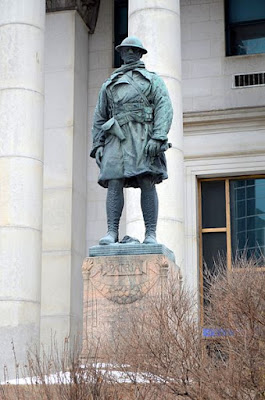In October 2015, volunteer Jean Longstaff wrote about the research she had begun into local men who found their way to Canada and served with the Canadian Army. This week, Jean gives us an update on what she has found out.
I started “doing the Canadians” in August and still find it as absorbing, if not more so, as I come across more and more ordinary people from the county who led extraordinary lives.
Of the 400,000 Canadians who volunteered for service in WWI, 70% were recent immigrants from Britain and just under three thousand came from County Durham, as one Durham man wrote “at times, when duty calls, we have to set our jaws a little firmer, and remember the Great Cause for which we are enduring discomforts and hardships”. They too were volunteers, but life was perhaps a little harder for them than for us!
I’ve met men who worked at the old brewery at Castle Eden, sons of vicars, Justices of the Peace, and magistrates, schoolmasters, miners of both lead and coal, farmers, paper-makers, sons and fathers from all ranks of life, from all areas of the county. What tales they have to tell.
 |
| Memorial to soldiers who worked for the Bank of Montreal, outside the offices in Winnipeg, Canada (Wikimedia Commons - public domain) |
Have you ever been to Winnipeg and seen a statue of a soldier outside the offices of the Bank of Montreal? At first glance it looks like a standing version of Seaham’s “Tommy” - but that’s probably just the greatcoat and helmet. The model for that soldier was a Sunderland man, Wynn Bagnall, who rose from Gunner to Acting Major and won the Military Cross.
For a different soldier, by sheer chance I came across an article that implied that the 18 year old Weardale man I was researching had been charged with manslaughter and was to appear before Durham Assizes. My initial thought here was “were we still transporting convicts to the colonies in the twentieth century, was that why he went to Canada?” - pause for breath and think rationally, no of course not, delve a bit deeper. Then you discover that the minute books of the Assizes for the relevant date were destroyed by a clerk during the Second World War, did he think that they would be of use to the Germans? So you start searching the Northern Echo, trying not to get waylaid by other interesting articles only to find that the judge literally gave him a slap on the wrist, said naughty boy I know you didn’t mean to kill anyone, don’t do it again and sentenced him to two weeks in prison with no hard labour! The village obviously forgave him too as he married a local girl and returned to live there after the war.
I got stuck on another man as on his enlistment paper he had given his brother’s date of birth, so I ended up with two Josephs born in the same quarter of the same year with both births registered in Lanchester. How to unravel this? I checked other family trees on Ancestry and it looked as though quite a few others had confused the two men, then I came across a name I thought I recognised, put two and two together, and luckily made four. I got in touch with someone I had worked with in a previous life and discovered that her great uncle was the Joseph I wasn’t looking for, so I could rule out all those details and concentrate on the right one.
 |
| D/DLI 7/913/178 Embroidered postcard of Canadian and British flags, with a maple leaf |
There is plenty of material out there but some you have to take with a pinch of salt. I found an article about someone’s great-aunt who happened to be the wife of a man I was researching and it had gone down in family history that she was a survivor of the Titanic. She wasn’t, that is something that has been well documented and is easy to check. It’s a person’s life post war that can be most difficult, as mentioned on previous blogs, and I have decided it is better to ignore what could be “duff gen” as an old boss used to say.
I never dreamt that I would end up reading books on Canadian military history, not my usual choice of reading matter. I usually read historical Regency novels, but even they came to mind when I was looking at a census report for one boy and in the house along with the housekeeper, cook, and nanny was a “monthly nurse”, shades of Georgette Heyer.
My knowledge of Canadian geography hasn’t improved - you could still show me a map and I wouldn’t be able to name the provinces correctly or put towns in the right place - but I can now at least spell SASKATCHEWAN.
Jean Longstaff, Durham at War volunteer

No comments:
Post a Comment